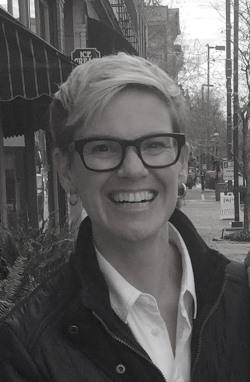Prof. Kenneth Gouwens (UConn History) writing about his research trip to the Folger Shakespeare Library
It’s always a rich opportunity to visit the Folger. At the peak of the August heat wave, I spent the two days in air-conditioned comfort working through rare books that I’d identified on an earlier trip as meriting more attention. Seated in the beautiful older wing, I first returned to Hieronymus Fabricius ab Aquapendente, one of the foremost anatomists in the initial generations after Vesalius’s On the Fabric of the Human Body (1543). As part of a larger project on the simian/human boundary in the Renaissance, I’ve analyzed just how Vesalius criticized the ancient physician Galen for dissecting barbary apes in lieu of human cadavers. Following the lead of Aristotle, Fabricius devoted attention not just to the human but to a variety of animals to assess how they propel themselves, to what extent they are capable of vocalizing, etc. My interest had been piqued by his pointing out how both Galen and Vesalius had erred, the latter, for example, in describing the musculature of the feet: clearly Fabricius was not one to shy away from going toe-to-toe with the greats. It turns out, though, that he invokes simians little if at all in his corrections of Vesalius. In short, my hunch didn’t pan out, but I was able to find that out efficiently and now know better how Fabricius fits into the story I’m telling.
More productive was directly comparing two books on prodigies: one by the Alsatian humanist Conrad Lycosthenes and the other by the English cleric Stephan Batman. Only when going through my notes and photos (for study purposes) of images had I noticed how closely Batman’s English resembled the Latin of Lycosthenes’s text (I’d looked at them months apart, two years ago). Sure enough,
Batman’s The Doome warning all men to Iudgemente (1581), which he had “gathered out of sundrie approved authors,” turns out to be mostly a close translation of Lycosthenes’ Prodigiorum ac ostentorum chronicon (1557). Examining the books side by side enabled me to see just how closely the illustrations in Batman’s book also mimicked those of its antecedent. For example, there’s a strong family resemblance between their portrayals of a baboon (pauyon), a hairy animal of India that enjoys fruit and lusts after human females. In both cases we are told about a specimen of this beast on display in Germany in 1551.
Batman’s image of the tailed ape (cercopithecus), by contras t, is modeled more loosely upon that in Lycosthenes — which in turn is obviously based on the highly influential image in Breydenbach’s 1486 Latin book on a pilgrimage to the Holy Land. So, in a brief time at the Folger, I was able to see the distinctions and similarities, both literary and artistic, in how knowledge was being transmitted among these authors.
Rare books were of course central to the trip, but I’d be remiss not to mention afternoon tea in the Folger’s basement. Rather like the coffee bar at the Vatican Library, it provides a locus for shop-talk with others working in the collection. I highly recommend to all researchers that they carve out time for the tea. In fact, that’s where I got some key tips on questions to ask about my favorite image in the Folger, an engraving of a monkey wearing a ruff. But that’s a subject for another time. Warm thanks to UConn’s Folger Committee for making this trip possible!
 UConn History Professor Micki McElya presents her new book,
UConn History Professor Micki McElya presents her new book,
